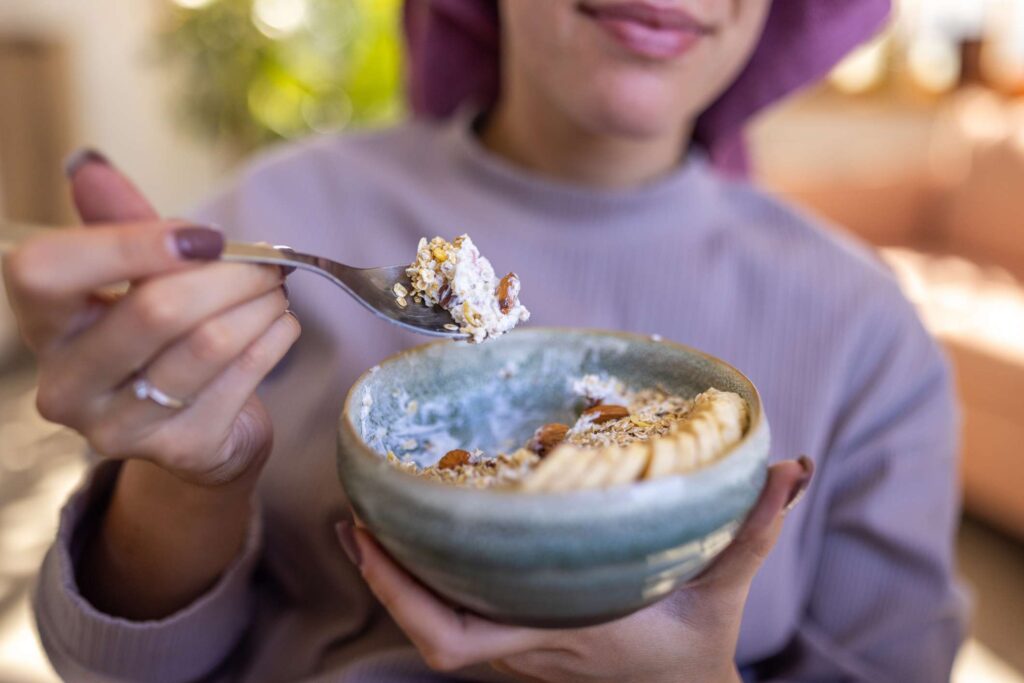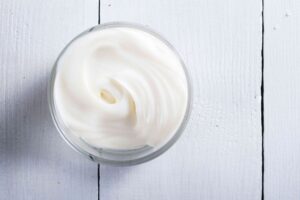:max_bytes(150000):strip_icc():format(jpeg)/Health-GettyImages-1459453877-bf0bec83265c4683a8990788a7d0957e.jpg)
Fiber is an essential nutrient for health and is found in plant foods. There are two types of fiber: soluble and insoluble. Soluble fiber comes from the inner parts of plants and turns into a gel in your gut. Among its many benefits, soluble fiber binds to cholesterol in your small intestine, blocking its absorption. This can help keep cholesterol levels low.
Insoluble fiber comes from the outer layers of plants. It remains intact as it moves through your digestive system, helping bulk up stool, promote regular bowel movements, and aid overall digestion. Bacteria in the gut do not ferment (break down) insoluble fiber.
Soluble fiber ferments in the gut, which releases helpful by-products such as short-chain fatty acids (SCFAs). SCFAs have health-promoting effects, including fighting inflammation and supporting the immune system.
Psyllium seeds are typically available in ground form, known as psyllium husk or psyllium powder. One tablespoon contains about 6-7 grams of fiber, 5-6 grams of which is soluble fiber.
One review found that taking psyllium before meals can support weight loss in people with overweight or obesity. It also improves blood sugar, lowers cholesterol and blood pressure, aids digestion, and relieves constipation and irritable bowel syndrome (IBS) symptoms.
Oat bran is the outer layer of the oat grain. The bran of a grain contains fiber, B vitamins, and antioxidants. One cup of cooked oat bran provides about 6 grams of fiber (2 grams soluble).
Oatmeal is made from oats cooked in water or milk. One cup of cooked oatmeal made with water contains about 4 grams of fiber (2 grams soluble). Oats are rich in beta-glucan, a soluble fiber that helps lower blood sugar and cholesterol levels.
Barley is a great source of fiber. It’s also rich in nutrients like manganese and selenium, both of which have antioxidant effects. It also contains beta-glucan.
One cup of cooked barley has 8 grams of fiber (2 grams soluble). To ensure you’re getting whole grain barley, look for the 100% Whole Grain Stamp and labels like whole, hulled, or hull-less, rather than pearled or semi-pearled.
One medium apple with the skin has about 4 grams of fiber (1 gram soluble).
Apples also contain quercetin, a natural plant compound with antioxidant and anti-inflammation effects. It may help reduce swelling, fight cancer cells, control blood sugar, and protect your heart.
A medium banana provides about 3 grams of fiber (1 gram soluble). Bananas are also a good source of potassium and vitamin B6, with 422 milligrams of potassium, or 9% of the Daily Value (DV), and 0.4 milligrams of vitamin B6 (25% of the DV). Potassium supports the heart, muscles, and nerves, while vitamin B6 aids metabolism.
Berries are packed with nutrients and plant compounds that have antioxidant and anti-inflammatory effects. They’re also a good source of fiber. Half a cup of blackberries has about 4 grams of fiber (1 gram soluble) and 15.1 milligrams of vitamin C (17% of the DV).
Citrus fruits like oranges and grapefruit are good sources of soluble fiber. A medium-sized citrus fruit has 2-3 grams of fiber (2 grams soluble). Citrus fruits are also known for their high vitamin C content. For example, a small orange packs 51 milligrams of vitamin C (57% of the DV).
A medium nectarine has about 2 grams of fiber (1 gram soluble). It also provides 0.1 milligrams of copper (14% of the DV). Copper is a mineral that helps with energy production and supports the nervous and immune systems.
One medium peach contains about 2 grams of fiber (1 gram soluble). It also has 9.9 milligrams of vitamin C (11% of the Daily Value). Vitamin C supports the immune system, aids collagen production, and enhances iron absorption from plant-based foods.
A medium pear provides about 4-6 grams of fiber (2 grams soluble). Pears provide 0.146 milligrams of copper (16% of the DV) and 7.65 milligrams of vitamin C (9% of the DV).
The skin on produce like pears and apples is rich in fiber and nutrients, so it’s beneficial to eat these fruits with the peel.
Prunes have a natural laxative effect due to their fiber and sorbitol content. A half-cup of prunes contains about 3 grams of fiber (1.5 grams soluble).
Prunes are also high in vitamin K, providing 52 micrograms (43% of the DV) in a half-cup serving. Vitamin K is important for proper blood clotting and bone health.
Broccoli is packed with glucosinolates and sulforaphane, which offer antioxidant, anti-inflammatory, and anticancer benefits. A half-cup of cooked broccoli has 1.5 grams of fiber (1 gram soluble). It’s also rich in vitamin K, with one cup of raw broccoli providing 92.8 micrograms (77% of the DV).
Brussels sprouts, like broccoli and other cruciferous vegetables, contain sulforaphane. A half-cup of cooked Brussels sprouts provides 4.5 grams of fiber (3 grams soluble).
Brussels sprouts are also rich in vitamin C, providing 48.4 milligrams (54% of the DV) in a half-cup boiled serving, and vitamin K, providing 109 micrograms (90% of the DV).
A half-cup of cooked carrots provides 2.5 grams of fiber (1 gram soluble). Carrots are rich in vitamin A, with one cup of raw slices or strips offering 1,020 micrograms (113% of the DV). Vitamin A supports vision, immune health, and growth and development.
Beans are a great source of plant protein and nutrients. A half-cup of cooked black beans provides 5.5 grams of fiber (2 grams soluble).
A half-cup of cooked black beans also contains 7.6 grams of protein and 60 milligrams of magnesium (15% of the DV). Magnesium is involved in over 300 bodily reactions, including nerve and muscle health as well as blood sugar and blood pressure control.
A half-cup serving of cooked kidney beans provides 6 grams of fiber (3 grams soluble).
Like many beans, kidney beans are also packed with nutrients like folate. A half-cup of cooked kidney beans contains 115 micrograms of folate (29% of the DV), which is needed for DNA production and cell division.
A half-cup serving of cooked lima beans provides 6.5 grams of fiber (3.5 grams soluble). Most beans are also a good source of potassium. A half-cup of cooked lima beans contains 477 milligrams of potassium (10% of the DV).
A half-cup serving of navy beans contains 6 grams of fiber (2 grams soluble).
A half-cup of cooked navy beans also provides 2.2 milligrams of iron (12% of DV). Iron is essential for making hemoglobin, a protein in red blood cells that carries oxygen throughout your body.
A half-cup serving of cooked pinto beans offers 7 grams of fiber (2 grams soluble).
Most beans are also a good source of selenium. A half-cup of cooked pinto beans provides 5.3 micrograms of selenium (10% of the DV), 1.78 milligrams of iron (10% of the DV), and 147 micrograms of folate (37% of the DV).
The fiber you need daily depends on your age and sex. Adults aged 19-50 need 25 grams daily for women and 38 grams for men. For adults 51 and older, women should aim for 21 grams daily and men 30 grams daily.
Experts suggest about one-fourth of your fiber should be soluble, which is about 5-10 grams daily, depending on your age and sex.
Soluble fiber helps lower cholesterol, reducing your risk of heart disease. It also slows digestion, stabilizes blood sugar, and reduces insulin spikes.
Soluble fiber thickens stomach contents, slowing emptying and promoting satiety, which may aid in weight management. Some types of soluble fiber have antioxidant effects and may lower the risk of certain cancers, including breast cancer.
Fiber, including soluble fiber, comes from a variety of plant foods. It’s important to include a range of plant foods in your diet to enjoy their different flavors, nutrients, and health benefits. Here are some ways to add more soluble fiber to your diet:
- Enjoy oatmeal for breakfast, topped with chopped apples or pears
- Blend banana, nut butter, milk, and ice into a refreshing smoothie
- Stir psyllium powder into your cereal for an extra fiber boost
- Pair carrot sticks or broccoli florets with nutritious dips like hummus or guacamole
- Snack on fresh fruits such as blackberries and citrus
- Eat cooked barley as a side dish or mix it into salads or soups
- Add kidney beans to chili
- Make a hearty bean soup with vegetables like carrots, celery, and onion
Fiber is essential for overall health, with soluble fiber providing benefits such as lowering cholesterol and stabilizing blood sugar. Many plant foods contain both soluble and insoluble fiber, but certain grains, like oats and barley, as well as beans, fruits, and vegetables, are particularly rich in soluble fiber.
Incorporating a variety of these foods into your daily meals and snacks can help boost your fiber intake and provide important vitamins, minerals, and beneficial plant compounds.













